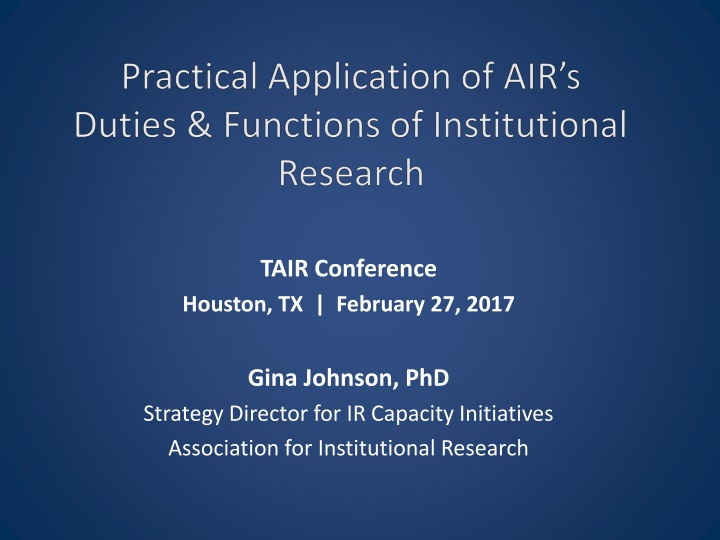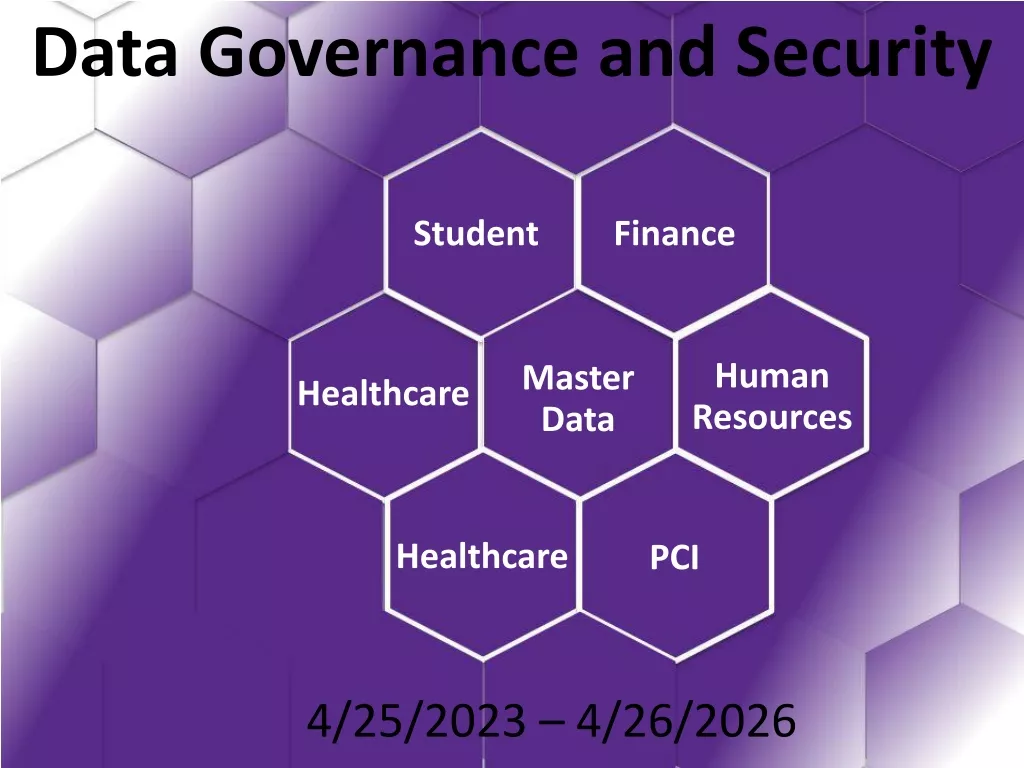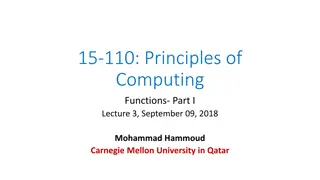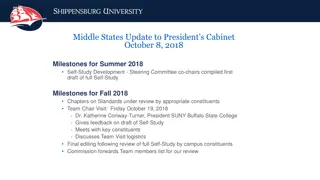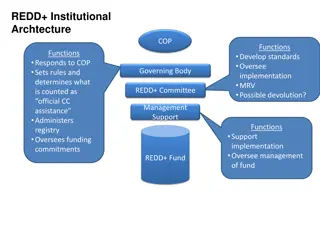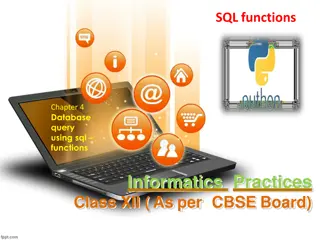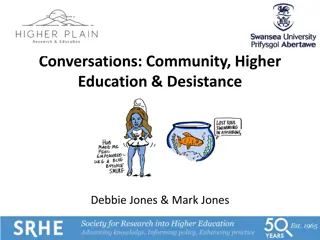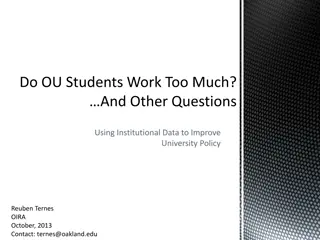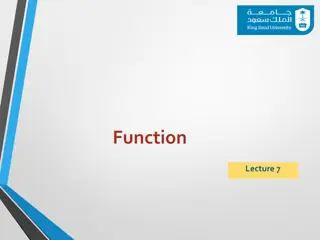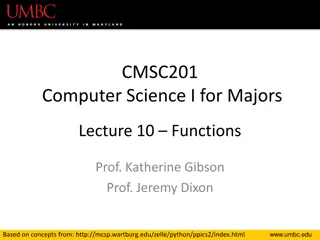Role and Functions of Institutional Research in Higher Education
This content discusses the importance of developing duties and functions for Institutional Research (IR) professionals in higher education institutions. It highlights the key responsibilities of IR, such as identifying information needs, collecting and analyzing data, serving as data stewards, and educating stakeholders. Emphasizing the significance of defining the IR field, it explores how enhancing professionalization and marketing can benefit stakeholders. The presentation also delves into the essential skills and knowledge required for IR practitioners to effectively carry out their roles. Overall, the content underscores the crucial role IR plays in supporting evidence-based decision-making and institutional effectiveness in academia.
Uploaded on Oct 07, 2024 | 1 Views
Download Presentation

Please find below an Image/Link to download the presentation.
The content on the website is provided AS IS for your information and personal use only. It may not be sold, licensed, or shared on other websites without obtaining consent from the author.If you encounter any issues during the download, it is possible that the publisher has removed the file from their server.
You are allowed to download the files provided on this website for personal or commercial use, subject to the condition that they are used lawfully. All files are the property of their respective owners.
The content on the website is provided AS IS for your information and personal use only. It may not be sold, licensed, or shared on other websites without obtaining consent from the author.
E N D
Presentation Transcript
TAIR Conference Houston, TX | February 27, 2017 Gina Johnson, PhD Strategy Director for IR Capacity Initiatives Association for Institutional Research
Presentation Outline Why develop Duties & Functions of IR? The Duties & Functions of IR Using the Duties & Functions of IR Conversation
Why the Duties & Functions of IR? Policy Governance Ends Institutional researchers have the knowledge and skills necessary to perform the duties and functions of institutional research, including: methods and tools; internal institutional effectiveness; external accountability; professional and interpersonal skills; and research and scholarship
Why the Duties & Functions of IR? Further defining the field can lead to enhanced professionalization Further defining the field allows easier marketing of our work to stakeholders Assessment of IR functions Assessment of professional development needs of IR professionals
The Duties & Functions of IR Identify information needs Collect, analyze, interpret, and report data and information Plan and evaluate Serve as stewards of data and information Educate information producers, users, and consumers https://www.airweb.org/Resources/Pages/IR-Duties-Functions.aspx
Identify information needs This functional area reflects the iterative process of identifying relevant stakeholders and their decision support needs. It includes anticipating questions through review of data, information, and research and policy studies, including those related to institutional, state, national, and international conversations around higher education. It also includes assisting stakeholders in developing and refining research questions.
Collect, analyze, interpret, and report data and information This functional area reflects the technical tasks employed by institutional research to provide data, information, and analysis for decision support. It involves an understanding of the data available to answer pressing questions about student access and success and institutional operations and the process by which previously unavailable data are collected. The process of collecting and reporting required and requested data is encompassed in this area. This function also incorporates applied research methods to analyze data to provide information for decision making, including appropriate interpretation of analysis results.
Plan and evaluate Planning may include operational, budgetary, and strategic planning in which institutional research collaborates with other units at the institution, state, or related organizations. It may also include program review, particularly for accreditation purposes. Formative and summative evaluation processes conducted at an institution use IR data and analysis for planning and decision making purposes.
Serve as stewards of data and information This functional area highlights institutional research s role in ensuring an institution-wide data strategy. Compliance issues such as privacy and security and ethical issues such as determining what data and information should be used for various purposes, and whether interpretations are correct and appropriately used, are also critical to this area. This area also includes the contribution of IR to data quality assurance activities. IR s role in ensuring data are appropriately accessible and usable to those who need them to make decisions is inherent in this function as well.
Educate information producers, users, and consumers This functional area encompasses the training and coaching related to the use of data, analysis, and information to inform decision making. Education can be focused on ensuring the ability to collect, access, analyze, and interpret information independently and in collaboration with other stakeholders. The function also includes a collaborative role in convening discussions related to information needs and connecting internal and external producers and users of data with one another for purposes of informing decision making. Scholarship to inform and improve data, information, and analysis for decision support is also included in this function.
Definition of IR Examples As an institutional researcher, I provide data, reporting and research that supports institutional planning, strengthens teaching and learning, and provides an understanding of the meaning and quality of education at Harvey Mudd College. Laura Palucki Blake, Harvey Mudd College IR s mission is to collect, organize, analyze, interpret, and disseminate institutional data and intelligence for the purpose of decision-making, policy formation, planning, and assessment of programs and activities. In other words, if you have a question about your institution, we will work to find you meaningful and actionable information to answer it. Erika Farfan, Kenyon College
Institutional research comprises the collection, analysis, interpretation, and provision of data to support decision- making by colleges and universities, government offices, higher education associations, and for individual students, prospective students, and their families. Julie Carpenter-Hubin, The Ohio State University IR is work to support decision making and planning at the university. For example, helping understand why students drop out, comparing faculty salaries with peer universities, and doing lots of federal and state reporting. Bill Knight, Ball State University
The IR office serves to connect people with the information they need to make good decisions about Olin, whether they are trustees trying to solve a difficult problem or prospective students who are trying to decide where to apply to college. Jeremy Goodman, Olin College of Engineering I am a professional storyteller My role at the university is to tell a coherent story using data. Like any great story, there is a history that led us to where we are, a current conflict to overcome, and if we do the right thing then we will have a flourishing future. Michael Le, Humboldt State University
IR Function descriptions Forbes 4 essential questions your mission statement must answer: What Why For Whom What do we do? How do we do it? Whom do we do it for? What value are we bringing? 1. 2. 3. 4.
Gina Johnson, PhD Strategy Director for IR Capacity Initiatives Association for Institutional Research Email: gjohnson@airweb.org Twitter: @GinaJohnsonIR
